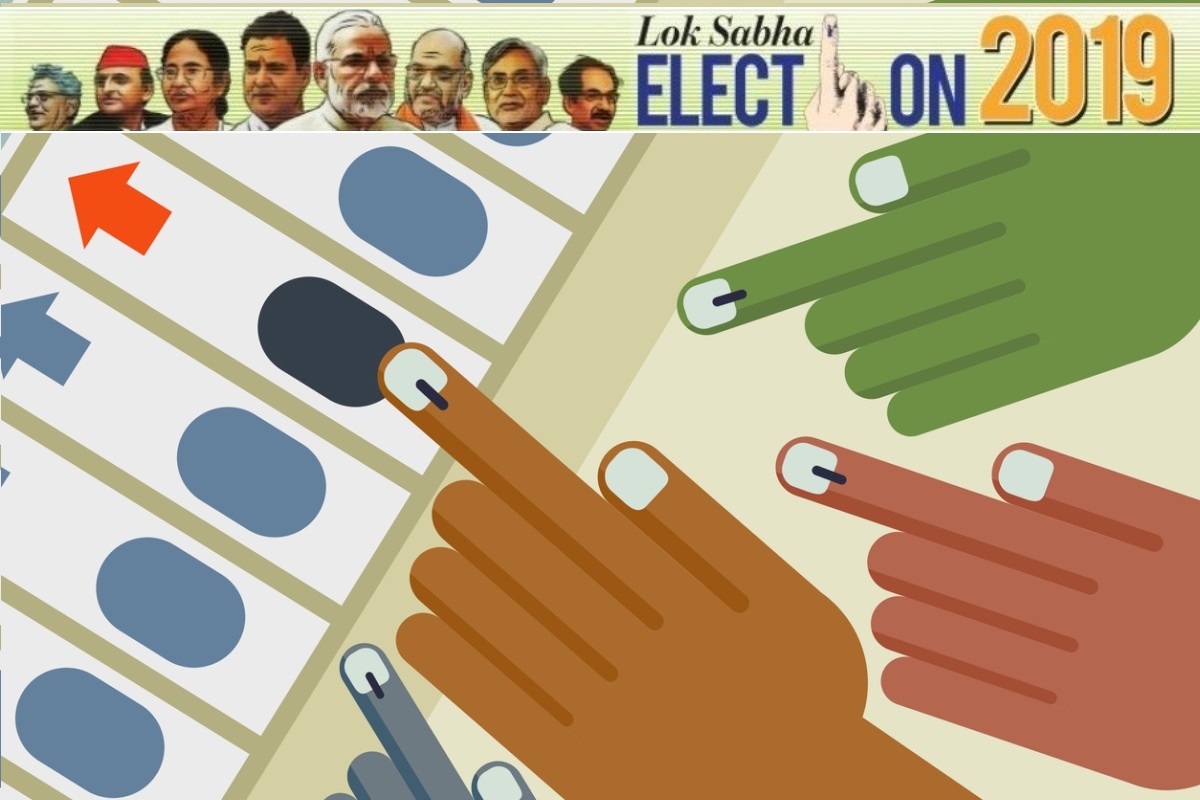Assam’s grand Jhumoir show: 8,000 performers, PM Modi to attend
Assam’s Jhumoir Binandini event on February 24 will feature over 8,000 performers showcasing the traditional Jhumoir dance at Sarusajai Stadium, Guwahati.
The biggest name in the last phase of the high-octane Lok Sabha elections 2019 is that of Prime Minister Narendra Modi, who is contesting from Varanasi in Uttar Pradesh.

(Photo: iStock)
The Lok Sabha elections phase 7 will be held on 19 May in 59 seats across 7 states and 1 Union Territory, which will mark the end of the high-octane elections to the 17th Lok Sabha in India.
A total of 918 candidates are in the fray, the maximum of which – 278 – are from Punjab. Around 10 crore voters will exercise their franchise in 1,12,986 poll stations in the constituencies where polling will be held.
Advertisement
The last phase of the elections will be keenly watched for two reasons – Varanasi and West Bengal.
Advertisement
Prime Minister Narendra Modi is seeking re-election from Varanasi. In 2014, he won from both UP’s Varanasi and Vadodara in Gujarat. He retained Varanasi. The PM is up against Congress’ Ajay Rai, who he defeated in 2014. The Samajwadi Party fielded Shalini Yadav against the PM after the candidature of Tej Bahadur Yadav was rejected by the ECI.
The remaining 9 parliamentary constituencies of West Bengal, too, will witness polling after a particularly bitter election campaign which saw unprecedented violence on Kolkata’s College Street. Stones were pelted on BJP chief Amit Shah’s roadshow triggering clashes between workers of his party and those of the ruling Trinamool Congress (TMC). A bust of 19th century Bengal renaissance icon Ishwar Chandra Vidyasagar was smashed. The BJP and TMC pointed fingers at each other for the destruction of the statue.
West Bengal is the only state in the country which has witnessed poll violence in each of the six phases of Lok Sabha elections held so far.
All Lok Sabha seats in Himachal Pradesh and Punjab will witness polling in this phase.
There will also be re-polling at 4 booths in Kerala’s Kasaragod and Kannur, a total of 13 booths in Tamil Nadu’s Dharmapuri, Theni, Thiruvallur, Cuddalore and Erode, five booths in Andhra Pradesh’s Chandragiri and Chittoor, one in Delhi’s Chandni Chowk, one in Haryana’s Faridabad, and 34 booths in ten constituencies of Odisha.
Here are the key constituencies and contenders to watch out for in Phase 6:
Bihar – 8
Constituency/ies that go to polls:
Nalanda, Patna Sahib, Patliputra, Arrah, Buxar, Sasaram, Karakat, Jahanabad
Number of contenders:
157
Main parties:
BJP+JD(U)+LJP, Mahagathbandhan of RJD+Congress+others
Key contest/s:
Patna Sahib – BJP’s Ravi Shankar Prasad versus Congress’ Shatrughan Sinha
Patliputra – Misa Bharti of RJD versus Ram Kripal Yadav of BJP
Himachal Pradesh – 4
Kangra, Mandi, Hamirpur, Shimla
Number of contenders:
45
Main parties:
BJP, Congress
Key contest/s:
Hamirpur – Anurag Kashyap of BJP versus Ram Lal Thakur of Congress
Jharkhand – 3
Constituency/ies that go to polls:
Rajmahal, Dumka, Godda
Number of contenders:
42
Main parties:
BJP, Congress+JMM+JVM+RJD
Key contest/s:
Dumka – BJP’s Sunil Soren versus Shibu Soren of JMM
Madhya Pradesh– 8
Constituency/ies that go to polls:
Ujjain, Mandsour, Ratlam, Dhar, Indore, Khargone, Khandwa, Betul
Number of contenders:
82
Main parties:
BJP, Congress
Key contest/s:
Mandsour – Sudhir Gupta of BJP versus Meenakshi Natarajan of Congress
Punjab – 13
Constituency/ies that go to polls:
Gurdaspur, Amritsar, Khadoor Sahib, Jalandhar, Hoshiarpur, Anandpur Sahib, Ludhiana, Fatehgarh Sahib, Faridkot, Firozpur, Bathinda, Sangrur, Patiala
Number of contenders:
278
Main parties:
SAD+BJP, Congress, AAP
Key contest/s:
Gurdaspur – Sunny Deol of BJP versus Sunil Jakhar of Congress versus Peter Masih Cheeda of AAP
Amritsar – Hardeep Singh Puri of BJP versus Gurjit Singh Aujla of Congress versus Kuldeep Singh Dhaliwal of AAP
Anandpur Sahib – Manish Tewari of Congress versus SAD’s Prem Singh Chandumajra versus Narinder Singh Shergill of AAP
Bhatinda – Harsimrat Kaur Badal versus Amarinder Singh Raja Warring of Congress versus Baljinder Kaur of AAP
Firozpur – Sukhbir Singh Badal of SAD versus Harjinder Singh Kaka of AAP versus Sher Singh Ghubaya of Congress
Uttar Pradesh– 13
Constituency/ies that go to polls:
Maharajganj, Gorakhpur, Kushi Nagar, Deoria, Bansgaon, Ghosi, Salempur, Ballia, Ghazipur, Chandauli, Varanasi, Mirzapur, Robertsganj
Number of contenders:
167
Main parties:
BJP, Congress, SP+BSP+RLD
Key contest/s:
Varanasi – Narendra Modi versus Congress’ Ajay Rai versus Shalini Yadav of Mahagathbandhan
Gorakhpur – BJP’s Ravi Kishan versus Congress’ Madhusudan Tiwari versus Rambhuaal Nishad of Mahagathbandhan
Mirzapur – Apna Dal’s Anupriya Patel versus Lalitesh Pati Tripathi of Congress versus Rajendar Bind of Mahagathbandhan
Ghazipur – Manoj Sinha of BJP versus Ajit Prasad Kushwaha of Congress versus Afzal Ansari of Mahagathbandhan
West Bengal – 9
Constituency/ies that go to polls:
Dum Dum, Barasat, Basirhat, Joynagar, Mathurapur, Diamond Harbour, Jadavpur, Kolkata Dakshin, Kolkata Uttar
Number of contenders:
111
Main parties:
TMC, BJP, Congress, CPI(M)
Key contest/s:
Diamond Harbour – Abhishek Banerjee of TMC versus Nilanjan Roy of BJP versus Soumya Aich Roy of Congress versus Fuad Halim of CPI(M)
Kolkata Dakshin – Chandra Kumar Bose of BJP versus Mita Chakraborty of Congress versus Mala Roy of TMC versus Nandini Mukherjee of CPI(M)
Dum Dum – Sougata Roy of TMC versus Samik Bhattacharya of BJP versus Congress’ Saurav Saha versus Nepaldeb Bhattacharya of CPI(M)
Jadavpur – Mimi Chakraborty of TMC versus Anupam Hazra of BJP versus Bikash Ranjan Bhattacharya of CPI(M)
Chandigarh – 1
Constituency/ies that go to polls:
Chandigarh
Number of contenders:
36
Main parties:
BJP, AAP, Congress
Key contest/s:
Chandigarh – Kirron Kher of BJP versus Pawan Kumar Bansal of Congress versus AAP’s Harmohan Dhawan
Advertisement